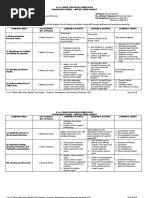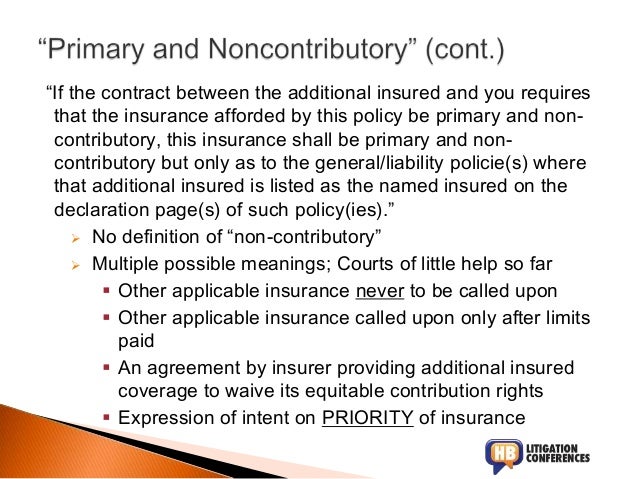Primary Non Contributory Endorsement Isosceles
Posted By admin On 26.08.19Construction contracts often require a subcontractor’s general liability insurance policy to name the owner or general contractor as an additional insured on a “primary and noncontributory” basis. This seemingly simple requirement can cause a lot of difficulty and may hamper the sub’s ability to start the project. The International Risk Management Institute (IRMI) recommends that risk managers not include this requirement in contracts. Insurance agents can add wording to a certificate of insurance only if the insurance company approves it. Insurance companies tend to resist adding this language to their policies and certificates.
- Primary And Noncontributory Endorsement Vs Waiver Of Subrogation
- Primary Non Contributory Endorsement Isosceles Mean
- Primary Non Contributory Endorsement Isosceles Angles
Why are the words “primary and noncontributory” such a problem?
Mar 14, 2016 The Primary and Non-Contributory Wording endorsement is meant to prevent contribution from happening. The Primary & Non-Contributory Wording endorsement says “this insurance will be the first one to pay (primary), and will not seek contribution from any other source (non-contributory).”. Primary, Non‐Contributory Endorsements Endorsement Form Number Carrier (may be multiple carriers) Primary Wording Acceptable Primary Wording Unacceptable Notes 00 AGL0103 00 02 13 Arch x 00 CGL 0130 00 09 06 Arch x 00 GL0308 00 11 06 Arch x Ongoing only and has unacceptable restrictions.
In liability insurance claims, when two policies cover the same loss, one usually applies on a primary basis and the other on an excess basis. This means that one will pay first (the primary policy), and the other will pay only if the primary policy either does not cover the loss at all or if the amount of insurance is not enough to pay for the entire loss. For example, if the primary policy has a limit of $1,000,000 each occurrence and the amount of the loss is $1,500,000, the primary will pay its limit of $1,000,000 and the other policy, which applies on an excess basis, pays the remaining $500,000.

Primary And Noncontributory Endorsement Vs Waiver Of Subrogation
With most contracts and insurance policies, the subcontractor’s coverage is automatically primary. The form’s wording makes the insured’s coverage excess over any policy that has added the insured as an additional insured by endorsement.
Primary Non Contributory Endorsement Isosceles Mean
Therefore, the “primary” part of the requirement is a minor issue. The “noncontributory” requirement is more of a problem. Most contracts do not define the term’s meaning, and most insurance policies and endorsements do not include it at all.
Primary Non Contributory Endorsement Isosceles Angles


The general contractor may believe it means that its policy will not pay even on excess basis; if the sub’s limit of insurance is not large enough to cover the loss, the general contractor may expect the sub to pay the remainder out of pocket. The standard additional insured endorsement to a general liability policy covers the additional insured with respect to liability for injury or damage caused at least in part by the sub’s acts or omissions. It also covers liability for acts or omissions of those working for the sub. Coverage lasts as long as the sub has ongoing operations for the additional insured. It does not say anything about the additional insured’s coverage being noncontributory. This is the problem: It is not standard insurance industry practice to cover additional insureds on a noncontributory basis. Insurance companies are reluctant to change that, as they want the additional insured’s coverage to contribute toward paying for the loss. A general contractor has less incentive to prevent losses when it knows that its own insurance will not be needed.
A contractor who runs into this requirement should notify his insurance agent immediately and ask the insurance company to provide the coverage. If it won’t, he must notify the general contractor and negotiate alternative terms in order to avoid breaching the contract. The general contractor may agree to accept the standard endorsement with a promise not to reduce its coverage. He should also consider asking the agent to seek this coverage at the next policy renewal. Most importantly, he must understand what the contract requires and ask questions about provisions that are unclear. No one wants to find out after an insured loss that he must pay part of it with his own money.